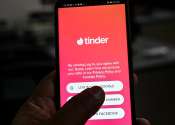What the DOJ's antitrust suit against Apple means for everyone with an iPhone
Cheaper app subscriptions. Additional payment options. Greater freedom for app developers on the App Store. More consumer choice.
Mar 22, 2024
0
1
Consumer & Gadgets

Cheaper app subscriptions. Additional payment options. Greater freedom for app developers on the App Store. More consumer choice.
Mar 22, 2024
0
1
Business

Dating app Tinder has promised to tell users in the EU why they are being charged different fees for the same service, after Brussels opened a probe following consumer complaints from Sweden and the Netherlands.
Mar 7, 2024
0
48
Business

European consumer groups lodged Thursday a complaint against Meta's system allowing Facebook and Instagram users to pay to opt out of data tracking, the second challenge this week.
Nov 30, 2023
1
1
Engineering

After a building failure due to natural disasters or poor structural design, safety inspectors must enter a structure to assess the damage before occupants can return. Researchers in the Penn State Department of Architectural ...
Mar 28, 2023
0
158
Business

Microsoft's planned $69-billion takeover of video game giant Activision Blizzard could significantly harm competition and consumer choice, UK regulators concluded in provisional findings Wednesday.
Feb 8, 2023
0
7
Consumer & Gadgets

When it comes to enhancing the sustainability of plastic beverage bottles, consumers are willing to pay a bonus for bio-based alternatives—the more so when the alternative is visually distinctive. This follows from research ...
Jan 31, 2023
0
3
Automotive

New electric vehicle models from multiple automakers are starting to chip away at Tesla's dominance of the U.S. EV market, according to national vehicle registration data.
Nov 29, 2022
0
5
Business

Britain launched Tuesday an in-depth competition probe into the domination of US tech giants Apple and Google of cloud gaming and mobile internet browsers.
Nov 22, 2022
0
31
Energy & Green Tech

Solar power gathered far away in space, is seen here being transmitted wirelessly down to Earth to wherever it is needed. ESA plans to investigate key technologies needed to make Space-Based Solar Power a working reality ...
Nov 9, 2022
0
5
Machine learning & AI

Across 70 years of data on media subtitles for television and film, architecture and engineering are the most positively portrayed professions, whereas sales-related professions fare worst, find the authors of a new study ...
May 18, 2022
1
75
Choice consists of the mental process of judging the merits of multiple options and selecting one of them. While a choice can be made between imagined options ("what would I do if ...?"), often a choice is made between real options, and followed by the corresponding action. For example, a route for a journey is chosen based on the preference of arriving at a given destination as soon as possible. The preferred (and therefore chosen) route is then derived from information about how long each of the possible routes take. This can be done by a route planner. If the preference is more complex, such as involving the scenery of the route, cognition and feeling are more intertwined, and the choice is less easy to delegate to a computer program or assistant.
More complex examples (often decisions that affect what a person thinks or their core beliefs) include choosing a lifestyle, religious affiliation, or political position.
Most people regard having choices as a good thing, though a severely limited or artificially restricted choice can lead to discomfort with choosing and possibly, an unsatisfactory outcome. In contrast, unlimited choice may lead to confusion, regret of the alternatives not taken, and indifference in an unstructured existence; and the illusion that choosing an object or a course leads necessarily to control of that object or course can cause psychological problems.
This text uses material from Wikipedia, licensed under CC BY-SA